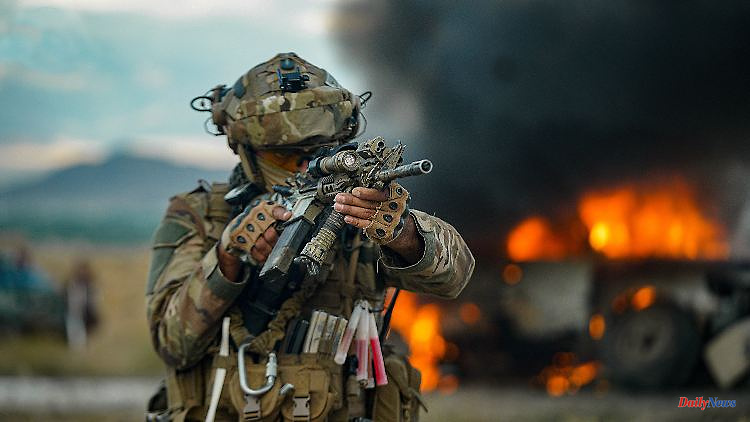Afghan activist Mariam Safi recently testified before the Bundestag's Afghanistan investigative committee and is disappointed by the lack of self-criticism in Germany. In an interview with ntv.de, she also warns against China's commitment that Afghanistan will "cannibalize" the country. About the current situation in Iran, she says: It's not just the women who are taking to the streets, the men are there with them. This courage of men is also needed in Afghanistan.
ntv.de: Ms. Safi, you recently testified in the investigative committee on Afghanistan. What is your impression of the committee?
Mariam Safi: I am very happy that the German parliament is allowing this investigation into Afghanistan. Germany, along with the US, has played a key role in my country. What happened to Afghanistan should not happen to any other country. Unfortunately, it is often the case that we do not learn from the past. For example, when it comes to the importance of local ownership.
What do you mean by that?
Local ownership allows a society that is being intervened to help shape its new reality. You have to understand: Afghanistan has a centuries-old society and culture. Establishing something completely new without allowing people to participate in it is bound to lead to disaster. For example, Germany was given the task of training the police forces. The Americans were in charge of the army, the Italians were in charge of the judiciary. But the people of Afghanistan were left out.
In which areas should Germany be particularly self-critical?
If there's one thing Germany should really look at again, it's the training of Afghan police forces. There have been efforts by the international community to make the Afghan police more civil. It was a good initiative to build capacity within the police force to focus on law and order. However, it was not at all clear how this change was to be carried out, and ultimately the question arose as to whether these were realistic expectations at all, since Afghanistan was still a country in absolute conflict at that point in time. In 2018, Kabul saw more Taliban terrorist attacks than any other city in the country. How could the Afghan army have handled these attacks without the police?
What impact did this strategy have?
One of the consequences of the process of "civilizing" the police was that experienced police officers were retired at the age of 55. New and inexperienced cadets, some as young as 30, were given jobs they didn't really deserve. I raised my concerns with the then Home Secretary and the international community, but there were no replies. It simply shows how unrealistic the overall strategy ultimately dictated by the international community was. Afghanistan, on the other hand, was the only way to continue receiving financial support.
Overall, is Germany self-critical enough with regard to its engagement in Afghanistan?
I'm actually really surprised about that. What I've heard from some of the experts on the committee so far doesn't suggest that Germany is particularly self-critical. To put it bluntly: the international community has of course not done everything wrong. But do you know the saying "All's well that ends well"? The truth is: it ended in disaster. I don't want to smear Germany's efforts - the youth initiatives, the work with civil society organizations. These efforts are worth noting. But the truth is that, over time, international actors grew tired and frustrated. And ultimately there was too little coordination among themselves.
Do you trust the expertise of those testifying on the investigative committee?
It's not a question of trust, but rather a question of perspective. I hope that the committee will invite more Afghans from different sectors of society to share what they have seen and experienced. The international people who have worked in Afghanistan have often been isolated from real reality. We need more Afghans on these committees.
I can still remember the many pundits arguing after the fall of Kabul that the Taliban were now "modern" and moderate. What do you say about these analyzes today?
Let me put it this way: "Taliban 2.0" never existed. The Taliban have published media-effective statements - nothing more. They have not backed up their words with action. Unfortunately, however, the Taliban and large parts of the international community have propagated this narrative of the "moderate" Taliban. In the country itself, we have never seen a single case that would have supported this narrative. Even before the end of the Islamic Republic of Afghanistan, women and all other critical voices were repressed and silenced in areas the Taliban already controlled. The draconian laws of the Taliban were fully implemented.
When we talk about Afghanistan, we often talk about the role of Germany or that of the USA. But what role does China actually play?
China has a major mining contract with Afghanistan, and accordingly, the relationship between the two countries over the past two decades has been shaped by economic interests. China has never actually met with civil society organizations. Something has changed in the last two years, however, and China has cautiously taken its first political stance on Afghanistan. The Taliban have even received invitations to talk to China.
When I met with the Taliban political office in 2016, I wanted to find out who could be a potential mediator in a peace process. I was quite shocked and surprised when the Taliban mentioned China and said they have a very good relationship with China.
How dangerous is China's engagement in Afghanistan?
Before the fall of the Afghan Republic, there were certain laws and environmental standards that had to be followed by countries investing in Afghanistan - for example, the mining laws passed by Parliament. With the Taliban in power and the repeal of those laws, China is now largely free. China will behave in a similar way as it has already done in other regions of the world, for example in Africa. China will cannibalize Afghanistan and deplete its resources. This is a very harmful and dangerous development. A respected Afghan journalist told a recent panel discussion that even the video footage that comes out of Afghanistan and is then used by the major international television networks comes largely from Chinese media outlets. This too is a worrying development.
The world is watching Iran right now. As a women's rights activist, what goes through your mind when you see these brave women protesting on the streets of Tehran?
It breaks my heart. I saw a woman, in an act of absolute desperation, rip off her headscarf and step on it. What saddens me is that women are driven to their actions because religious clergy use their religion against them. I'm sure women actually love their religion like other people love their religion. But when it's used to silence people over and over again, the distress becomes immeasurable. What I want to say: This is not about Islam, it is about the regime. Islam creates equality, respect and rights for women. But when you have a regime that decides what women can and cannot do based on male clergy's interpretations, that's a big problem. That's why I'm very proud of the women in Iran and I show my solidarity with them.
Can such an uprising also happen in Afghanistan?
What touches me when I see the pictures from Iran is that there are not only women on the streets there, but the men are there with them. In Afghanistan, courageous women are also protesting despite the Taliban standing in front of them with guns. The women do this knowing they could be killed or imprisoned. But the difference is: next to them you don't see any brothers, no fathers, no male friends. Their compatriots don't take to the streets with them. In Afghanistan, the men are absent. If that were to change, if the men were to show that presence too, well, the Taliban really wouldn't be able to hold out for long.
Philipp Sandmann spoke to Mariam Safi












